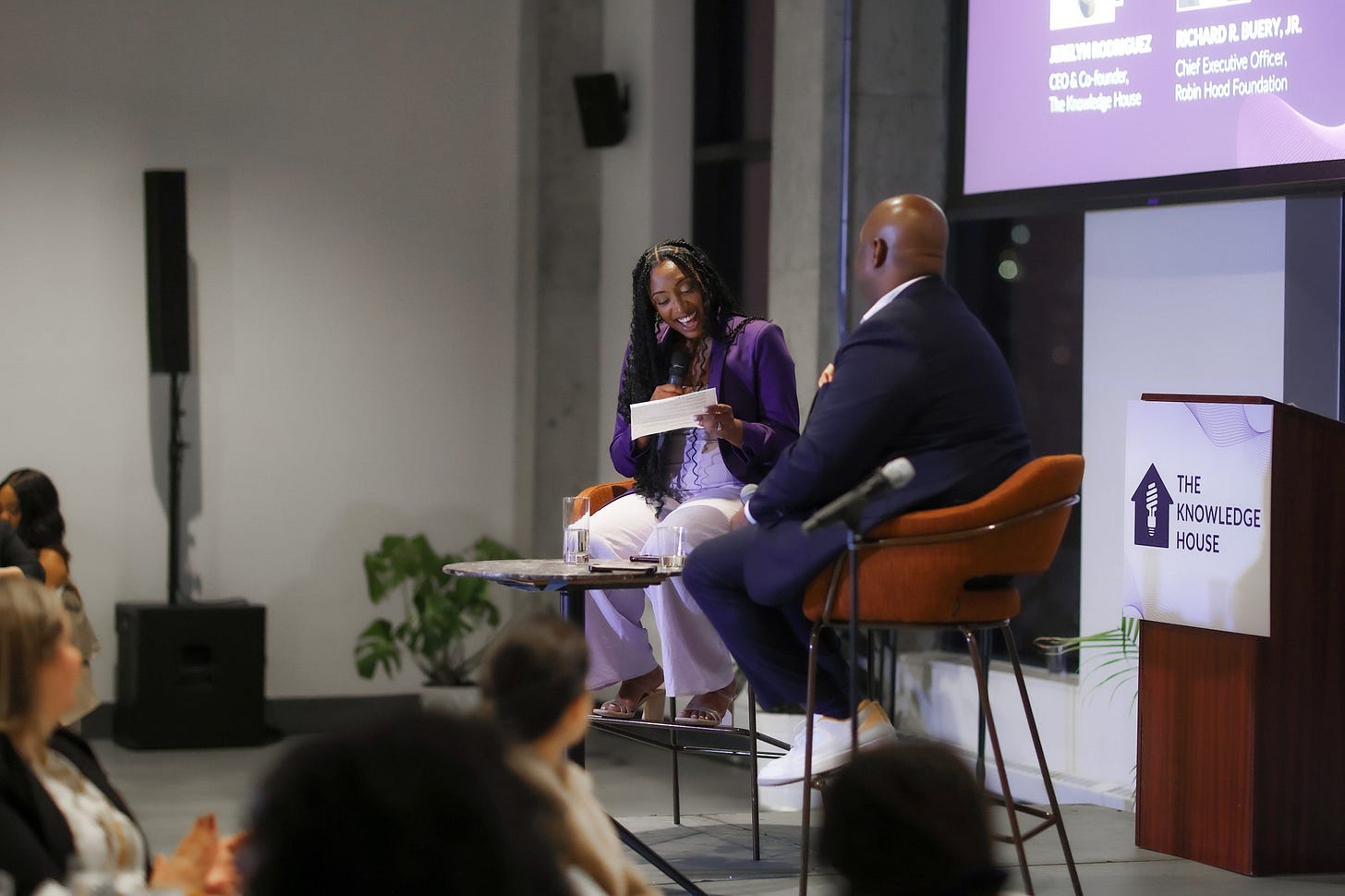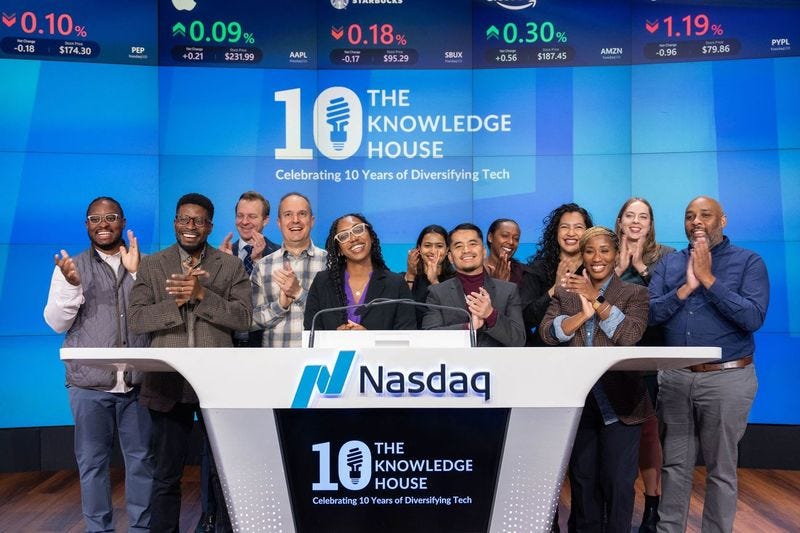Q&A: Jerelyn Rodriguez, CEO and Co-founder of The Knowledge House
a quick catch up with the founder of one of the Bronx's hottest nonprofits
💖Motivation Meows💖
Hello, and welcome to yet another edition of The Black Cat.
To read what you missed this week in Good Black News, click here. Otherwise, this week, we have a Q&A with Jerelyn Rodriguez, the co-founder and CEO of the nonprofit The Knowledge House, a Bronx-based nonprofit that provides STEM opportunities to underrepresented communities.
Feel free to send around, email me your reflections, and follow me on Instagram at dominicmadori
This month I’m reading: Slaves to Fashion by Monica Miller
This weekend, I can’t stop listening to: Rebel Soul by Michael Kiwanuka
💢From the Chatterbox💢
I was excited to receive an invitation to The Knowledge House (TKH) gala a few weeks ago. The event celebrated the 10-year anniversary of the Bronx-based nonprofit of the same name, which provides STEM opportunities for underserved communities. As someone working in tech, I love hearing about the efforts done to democratize access to technology and to help make the space more inclusive on a race, ethnic, and class level.
I chatted with Jerelyn Rodriguez, the co-founder and CEO of TKH about the 10-year anniversary of the nonprofit, what skill she thinks young people should focus on learning these days, and what impact tech will have on society in the next few years.
*This conversation has been edited slightly for clarity.
The Black Cat: What are some of the setbacks you’ve had these past ten years and how have you overcome them?
Jerelyn Rodriguez: A major challenge I experienced in building my career was Covid. Operating during a pandemic presented a new challenge for The Knowledge House (TKH). As a leader, I had to make a lot of difficult choices. TKH had a hiring freeze and let go of many consultants, which affected our capacity and program operations. This was overwhelming, especially by the end of 2020, as we prepared for a year of growth. Despite this, it was also a moment that I was extremely proud of. I quickly pivoted the organization from operating in-person to 100% remote and without a Director of Programs. We recruited students virtually, held pre-recorded info sessions, and promoted via social media. Applications for our programs doubled. The transition to virtual created the unique opportunity to expand our proven education and job placement to new students and partners in Atlanta, Los Angeles, and Newark. To sustain operations after the pandemic reduced the organizational budget, I led an annual campaign without the support of a Development Director. While Black female founders typically receive the least philanthropy, 2020 was a banner year for TKH. We secured $1M in new funding – the most in our history at the time. We received a $450,000 grant from the Robin Hood Power Fund and a grant from the NBA Foundation. There was also an increase in online giving, and we secured over ten corporate sponsorships. Our organizational budget doubled to $2.9M for 2021.
TBC: What are some essential skills right now that young people should look at learning?
JR: Young people should upskill in Data Analytics, with a focus on understanding how to clean, collect, manipulate, and analyze data, as well as create visualizations and graphs. With AI tools being run by data, a strong understanding of Data Analytics will help learners understand how AI works. Data tech jobs and skills will be less impacted by AI and learners that possess knowledge of data analytics will have an easier time building AI tools. Another skill that is essential right now is learning the best practices for how to leverage AI tools efficiently, and how to ask the right questions to yield the best results.
TBC: What are young people most concerned about right now when it comes to new technologies and social media, and how is it taking over their lives?
JR: Young people are concerned about privacy when it comes to social media and technology in their lives today. There has been an increase in access for hackers and scammers to manipulate intellectual property and use online images for harm. The rise in spam, phishing, and scamming has resulted in concerns that private data isn’t secure. Cyber Security and skills for average users to stay educated on the latest scams are so important to help young people identify the risks and how to avoid them so that they are able to protect themselves.
TBC: How much has AI impacted STEM jobs and training and how are you preparing students for a future where these STEM jobs might be taken by AI?
JR: This year we launched a working group to create an AI strategy focused on how best to utilize AI within our organization and across our programs. We believe that the current state of AI, especially GenAI, will enable us to enhance, optimize, or even transform our programming. This not only brings efficiency to our processes but ultimately elevates our ability to position young, underrepresented talent in the marketplace and uplift communities in NYC and beyond. Next year we will focus on upskilling staff to use AI to optimize learning and deliver programs more efficiently, by using AI Bots across online platforms for delivering class instruction and supporting job placement. In addition to upskilling staff, students also need to be ready for AI. In our digital literacy workshops, we are providing AI fundamentals to learners in our local communities, and in our Innovation Fellowship, we are teaching technologists how to build products using AI tools that are used in the industry. While we are still not sure exactly how AI will impact the jobs that we train for, we do know that our job seekers will be more competitive if they are using AI tools and know how AI works.
TBC: Do you think the broken talent pipeline is a myth or a real situation companies are struggling with?
JR: I do believe that the broken talent pipeline is somewhat of a myth. There are large numbers of computer science students who come from diverse backgrounds, but companies aren't hiring from colleges that aren’t elite. There is a lot of non-traditional talent coming from non-profits, bootcamps, and non-traditional programs that are not being hired by tech companies. Companies need to look beyond MIT, Stamford, and Ivy League schools for tech talent. Additionally, students need support building their social networks to put themselves in front of companies who are hiring.
TBC: How can they fix their pipelines, especially during a time when it seems companies are no longer as focused on increasing diversity within their workforce?
JR: Companies should engage in community engagement, corporate giving, and sponsorship to work closely with nonprofits that provide job training. Engaging in volunteering and mentoring for non-traditional job seekers will give companies a part in making sure that these learners are job ready, and will expose them to company-specific practices and values. All of this will support companies in having strong talent pipelines. Unfortunately, many companies have cut budgets and aren't currently supporting these activities and initiatives, and if that continues we won't see non-traditional talent hired. I hope that changes. If we don't see more investments in DEI and community engagement we won't be able to diversify tech talent.

TBC: How has the Great Rollback impacted you and what advice do you have for other organizations that are trying to stay afloat as dollars to DEI dry up?
JR: In 2021 and 2022 we received new funding because we were an org led by a Black leader and served Black communities, but much of that funding was one-time gifts. We had to diversify our funding so as not to rely on these resources. My advice to other organizations is to engage with the local community and the volunteers who support you so that they can give directly. Organizations can set up online fundraisers or plan in-person events so that people who support the organization every day can continue to support financially or through their time. My advice is to diversify revenue because philanthropy can be very fickle.
TBC: How did you pick which locations to expand to and where would you love to go next?
JR: Each of our cities has robust tech economies, has seen yearly growth in tech jobs requiring the skills instilled by TKH, and more than 40% of the population are Black and Latinx. TKH is expanding to Washington, D.C./DMV this year.
TBC: What have been some of your favorite success stories?
JR: TKH has impacted entire families through our work readiness programs, including two brothers: Souleymane in the KKCF program, and Lamine in the Data Science Innovation Fellowship. Both came to the Bronx as immigrants from West Africa. After TKH, Souleymane successfully enrolled at CUNY City Tech, and referred his older brother, Lamine, to the Innovation Fellowship. After TKH, Lamine was hired as a software engineer at Doran Jones. Souleymane is now in his last year of college and with Lamine’s new employment, they now have the income potential to uplift their family out of poverty.
Another program alumni who can illustrate TKH’s ability to improve the lives of young people is Clariza. She moved to the US from Mexico when she was 12 and had not participated in formal education as a child. As a hard-working young adult, she joined The Knowledge House and gained strong digital and professional skills. Now working as a data engineer, she says “The Knowledge House is like my home. They have helped me unlock a talent that I didn’t even know I had.” It is our joy to work with young people like Clariza, empowering them to secure economic prosperity for themselves and their families and live up to their full potential. Clariza went from Associate Software Engineer to Software Engineer after a year at Energy Hub.
TBC: What do you have coming up that everyone should know about and how can people help get involved?
JR: The Knowledge House has hosted a series of Tech Empowerment Days (TEDs) this fall that have provided hands-on tech skill development, opportunities to learn about careers in the tech industry, guest talks from industry professionals, and opportunities to network and build community. Our last TED will take place in Atlanta on November 15th and 16th. Additionally, the application for our next cohort of The Innovation Fellowship is now open. Participants in our upcoming Atlanta TED will also have the opportunity to complete the Innovation Fellowship application in person while attending the workshop.
💫Kitty Talk💫
New York Magazine, “My Monster Tenant”
The Atlantic, “What the Men of the Internet Are Trying to Prove”
New York Times, “The Priest, the Power Broker and the Pop Star”




